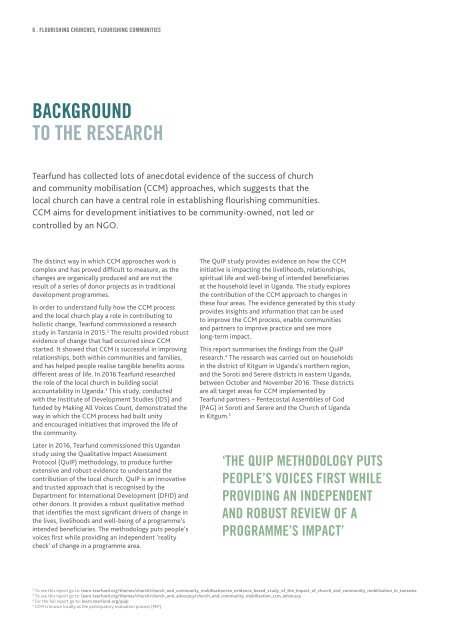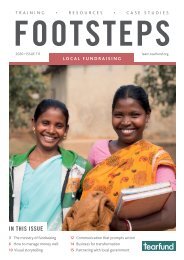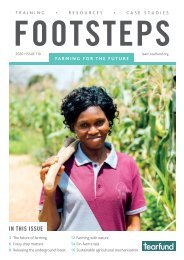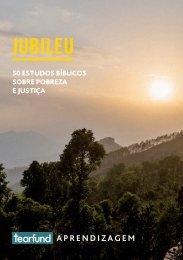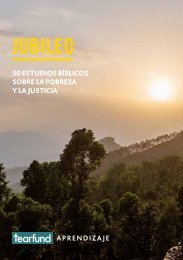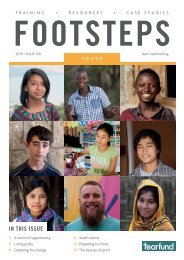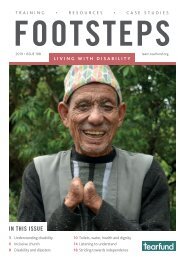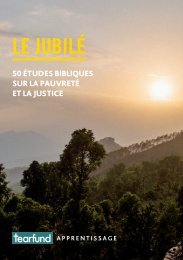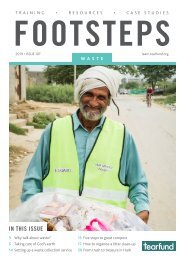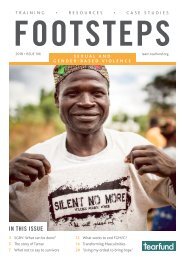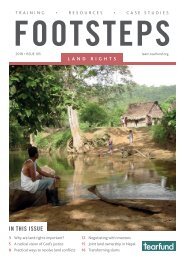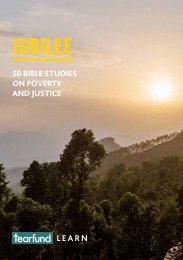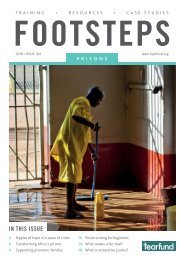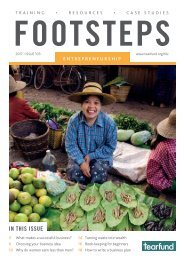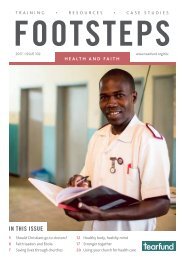2018-Tearfund-Flourishing-churches-flourishing-communities-church-and-community-mobilisation-in-Uganda-report-En
You also want an ePaper? Increase the reach of your titles
YUMPU automatically turns print PDFs into web optimized ePapers that Google loves.
6 . FLOURISHING CHURCHES, FLOURISHING COMMUNITIES<br />
BACKGROUND<br />
TO THE RESEARCH<br />
<strong>Tearfund</strong> has collected lots of anecdotal evidence of the success of <strong>church</strong><br />
<strong>and</strong> <strong>community</strong> <strong>mobilisation</strong> (CCM) approaches, which suggests that the<br />
local <strong>church</strong> can have a central role <strong>in</strong> establish<strong>in</strong>g <strong>flourish<strong>in</strong>g</strong> <strong>communities</strong>.<br />
CCM aims for development <strong>in</strong>itiatives to be <strong>community</strong>-owned, not led or<br />
controlled by an NGO.<br />
The dist<strong>in</strong>ct way <strong>in</strong> which CCM approaches work is<br />
complex <strong>and</strong> has proved difficult to measure, as the<br />
changes are organically produced <strong>and</strong> are not the<br />
result of a series of donor projects as <strong>in</strong> traditional<br />
development programmes.<br />
In order to underst<strong>and</strong> fully how the CCM process<br />
<strong>and</strong> the local <strong>church</strong> play a role <strong>in</strong> contribut<strong>in</strong>g to<br />
holistic change, <strong>Tearfund</strong> commissioned a research<br />
study <strong>in</strong> Tanzania <strong>in</strong> 2015. 2 The results provided robust<br />
evidence of change that had occurred s<strong>in</strong>ce CCM<br />
started. It showed that CCM is successful <strong>in</strong> improv<strong>in</strong>g<br />
relationships, both with<strong>in</strong> <strong>communities</strong> <strong>and</strong> families,<br />
<strong>and</strong> has helped people realise tangible benefits across<br />
different areas of life. In 2016 <strong>Tearfund</strong> researched<br />
the role of the local <strong>church</strong> <strong>in</strong> build<strong>in</strong>g social<br />
accountability <strong>in</strong> Ug<strong>and</strong>a. 3 This study, conducted<br />
with the Institute of Development Studies (IDS) <strong>and</strong><br />
funded by Mak<strong>in</strong>g All Voices Count, demonstrated the<br />
way <strong>in</strong> which the CCM process had built unity<br />
<strong>and</strong> encouraged <strong>in</strong>itiatives that improved the life of<br />
the <strong>community</strong>.<br />
Later <strong>in</strong> 2016, <strong>Tearfund</strong> commissioned this Ug<strong>and</strong>an<br />
study us<strong>in</strong>g the Qualitative Impact Assessment<br />
Protocol (QuIP) methodology, to produce further<br />
extensive <strong>and</strong> robust evidence to underst<strong>and</strong> the<br />
contribution of the local <strong>church</strong>. QuIP is an <strong>in</strong>novative<br />
<strong>and</strong> trusted approach that is recognised by the<br />
Department for International Development (DFID) <strong>and</strong><br />
other donors. It provides a robust qualitative method<br />
that identifies the most significant drivers of change <strong>in</strong><br />
the lives, livelihoods <strong>and</strong> well-be<strong>in</strong>g of a programme’s<br />
<strong>in</strong>tended beneficiaries. The methodology puts people’s<br />
voices first while provid<strong>in</strong>g an <strong>in</strong>dependent ‘reality<br />
check’ of change <strong>in</strong> a programme area.<br />
The QuIP study provides evidence on how the CCM<br />
<strong>in</strong>itiative is impact<strong>in</strong>g the livelihoods, relationships,<br />
spiritual life <strong>and</strong> well-be<strong>in</strong>g of <strong>in</strong>tended beneficiaries<br />
at the household level <strong>in</strong> Ug<strong>and</strong>a. The study explores<br />
the contribution of the CCM approach to changes <strong>in</strong><br />
these four areas. The evidence generated by this study<br />
provides <strong>in</strong>sights <strong>and</strong> <strong>in</strong>formation that can be used<br />
to improve the CCM process, enable <strong>communities</strong><br />
<strong>and</strong> partners to improve practice <strong>and</strong> see more<br />
long-term impact.<br />
This <strong>report</strong> summarises the f<strong>in</strong>d<strong>in</strong>gs from the QuIP<br />
research. 4 The research was carried out on households<br />
<strong>in</strong> the district of Kitgum <strong>in</strong> Ug<strong>and</strong>a’s northern region,<br />
<strong>and</strong> the Soroti <strong>and</strong> Serere districts <strong>in</strong> eastern Ug<strong>and</strong>a,<br />
between October <strong>and</strong> November 2016. These districts<br />
are all target areas for CCM implemented by<br />
<strong>Tearfund</strong> partners – Pentecostal Assemblies of God<br />
(PAG) <strong>in</strong> Soroti <strong>and</strong> Serere <strong>and</strong> the Church of Ug<strong>and</strong>a<br />
<strong>in</strong> Kitgum. 5<br />
‘THE QUIP METHODOLOGY PUTS<br />
PEOPLE’S VOICES FIRST WHILE<br />
PROVIDING AN INDEPENDENT<br />
AND ROBUST REVIEW OF A<br />
PROGRAMME’S IMPACT’<br />
2<br />
To see this <strong>report</strong> go to: learn.tearfund.org/themes/<strong>church</strong>/<strong>church</strong>_<strong>and</strong>_<strong>community</strong>_<strong>mobilisation</strong>/an_evidence_based_study_of_the_impact_of_<strong>church</strong>_<strong>and</strong>_<strong>community</strong>_<strong>mobilisation</strong>_<strong>in</strong>_tanzania<br />
3<br />
To see this <strong>report</strong> go to: learn.tearfund.org/themes/<strong>church</strong>/<strong>church</strong>_<strong>and</strong>_advocacy/<strong>church</strong>_<strong>and</strong>_<strong>community</strong>_<strong>mobilisation</strong>_ccm_advocacy<br />
4<br />
For the full <strong>report</strong> go to: learn.tearfund.org/quip<br />
5<br />
CCM is known locally as the participatory evaluation process (PEP).


